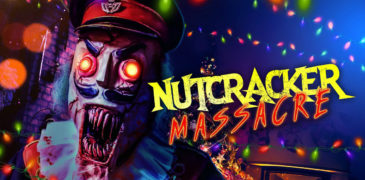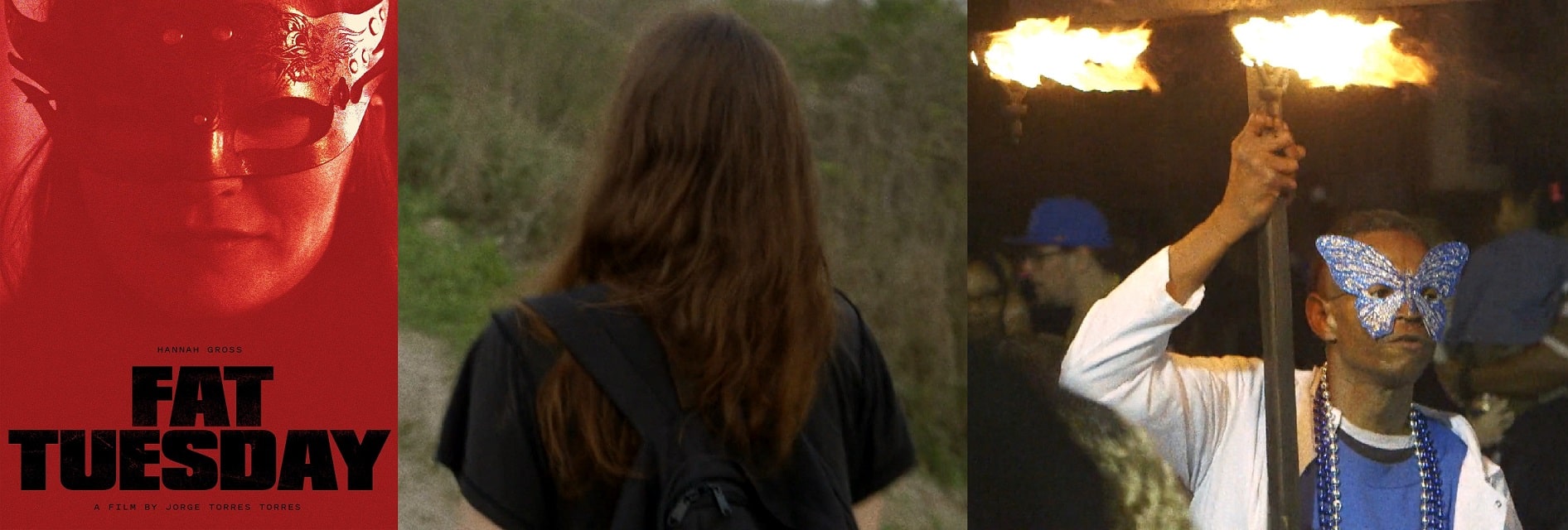
New Orleans, with its rich history and lots of tourist-friendly attractions, is a perfect setting for a horror movie – especially if it has anything to do with voodoo – but the last decade has seen it more and more as a backdrop for films that use it either for dramatic tension – to highlight some deeply personal stories – or to delve into its rich colonial history. It was recently featured in Synchronic, Aaron Moorhead and Justin Benson’s latest film, but director Jorge Torres-Torres has also used it in his earlier effort, Sisters of the Plague (starring actor-director Josephine Decker), which showcased the city’s modern life through a character study focused on fragility and trauma.
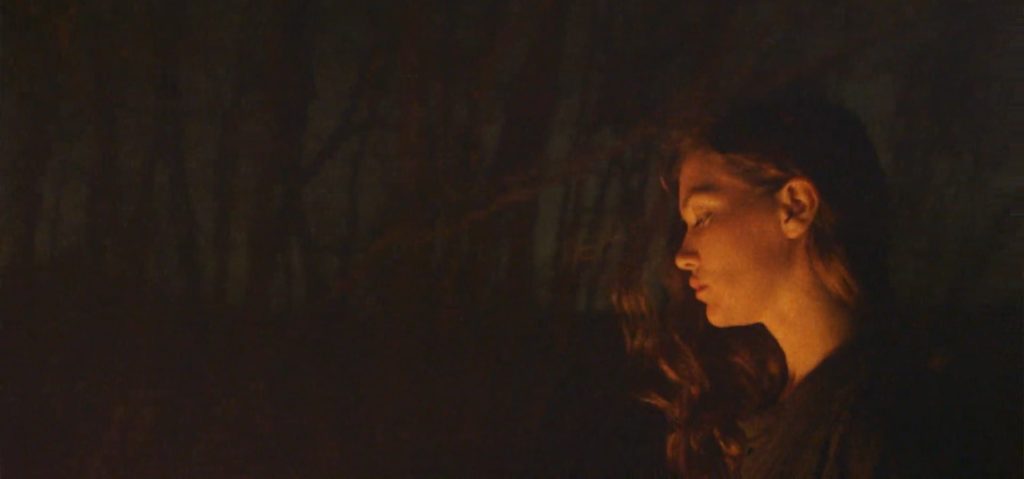
For his newest film, Torres-Torres returns to New Orleans, this time letting the story take place during the holiday of Mardi Gras, which is famous for people dressing up in garish costumes, playing and listening to music, eating great food and watching noisy crowds walk by (it is also a holiday dating back centuries, with great significance in Christian cultures, but that has changed in later years – now it’s more about celebrating and indulging in matters the Church would no doubt frown upon). It is as much a blend of city life and internal struggle as ‘Sisters’ was, but it is more focused, less abstract than Torres-Torres’s previous effort.
Fat Tuesday (which is actually a synonym for ‘Mardi Gras’) can be categorized as a mumblecore slasher doubling as a ‘festival/holiday horror’, albeit an unconventional one. For those new to mumblecore (a term coined by non-filmmakers and really disliked by some directors), it is a film movement that originated in the US in the mid-2000s (although its roots are arguably visible in the works of notable American independent filmmakers way before that), with directors like Joe Swanberg, Andrew Bujalski, Josephine Decker, Sophia Takal and Lawrence Michael-Levine on the rise, and actors like the prolific Kate Lyn-Sheil, Lindsay Burdge or Hannah Gross. It is Gross herself who stars in this movie, and she is no stranger to genre : she’s starred in the Shudder series ‘Deadwax‘, had a part in ‘Disappearance at Clifton Hill‘ and more recently in the unconventional ‘Flashback‘. It seems that Torres-Torres prefers to work with actors who broke out of the mumblecore scene and have left a mark on cinema (so far Decker, Gross and Sophie Traub, who appeared in his lesser-known experimental feature ‘Fugue‘).
This film mixes authenticity with pure low-budget filmmaking creativity and feels oddly intimate (despite being filmed on location – on busy, noisy streets), while managing to deliver truly creative kills. In fact, ‘intimate’ and ‘creative’ can describe Torres-Torres’s whole output. The festival serves as the perfect setting for a serial-killer movie: the crowds and the bustle allow for a person with murderous intent to exorcise their demons and pretty much avoid the fallout. Indeed, the killer here is one that has become more and more popular today: seemingly just a normal person who wants to try murdering someone just to see what it feels like (although the movie’s tagline says that they’re not a first-time killer – their reason for doing it might be more about triggering specific emotions or reliving a past event), once a year, in a crowded environment, and then going back to whatever life, family and friends they have.
The plot sees a lone woman quickly meeting up with and joining a group of partygoers during the festival. They talk, they share stories, then they head down the streets, for more drinking and partying. Pretty soon, one of them is revealed as a potential, then actual killer, and their modus operandi consists of trying to get each of the others alone in some way, in order to dispose of them. There is a lot of tension the movie plays with just because you just know where every little gesture, every touch, every nod, every promise of intimacy is actually going, and there are some extreme aspects of the kills that subvert both the viewer’s and the characters’ expectations. (You might think you’ve spotted a ‘final girl’ just because of how likeable and different from the rest she is, but this isn’t a film that cares much about respecting slasher tropes). It actually fits more into a wave of indie, low-budget films trying to reinvent the serial killer as a malevolent creative force opposing a perceived ‘otherness’, like in Patrick Brice’s ‘Creep 2‘ (or, to a lesser degree, Joe Swanberg’s ‘Privacy Setting‘.)
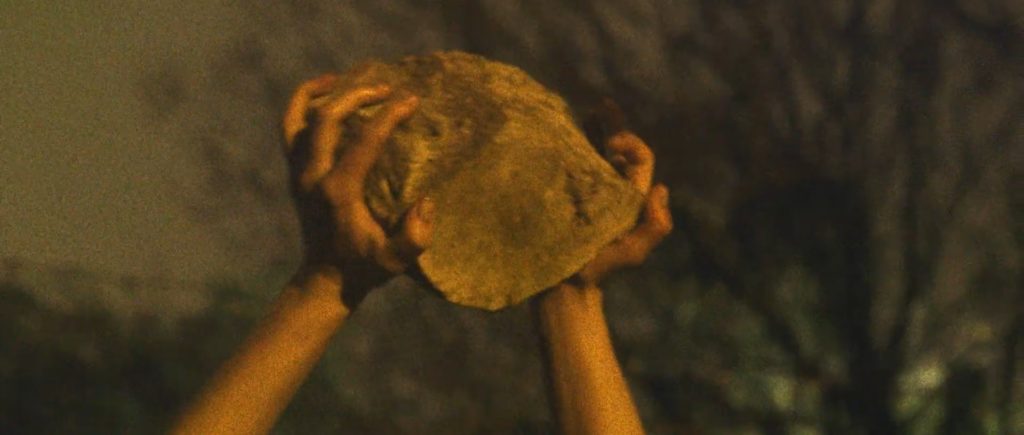
Both Brice’s film and this one use a dialectical approach: the killers don’t just end a person’s life – they transform their deeds as art for their own enjoyment. They try to both control and ultimately destroy an ‘other’ that they feel is quite similar, but ultimately threatening to them. It is hard to pinpoint the exact nature of this opposing force in both films, but it is clear that it is a real-world representation of something intrinsic to the killer – Brice’s film has him facing a midlife crisis (because he feels uninspired and old), then meeting a fellow video-artist who just wants to know him, and Fat Tuesday sees a killer in the early days of their spree, just finding their impulse, acting on it, and identifying what exactly it’s opposed to. You would be right to say that both killers are intrigued, but also appalled by the idea of real intimacy with another human being.
This movie has a lot of aces up its sleeve in the atmosphere department – the moody, ethereal soundtrack by Gangwave and Sarah Swallum, the authentic dialogue that sounds like something you’d overhear by listening in on an everyday group conversation (it is the complete opposite of the overwritten, satirical dialogue made popular in modern slashers like ‘Dreamcatcher‘ and ‘Triggered‘), the kills that get more and more creative and ritualistic as they go on (one of them is simply ingenious), and most of all, the finale, which has the feel of a spiritual experience, serving to remind us that Mardi Gras isn’t all about the binge-drinking. It is a perfect blend of the no-nonsense filmmaking and intimacy that mumblecore is known for, combined with the toolkit of the slasher film – it manages to transcend the ‘mumblegore‘ label that fans and critics have assigned to this sort of indie horror.
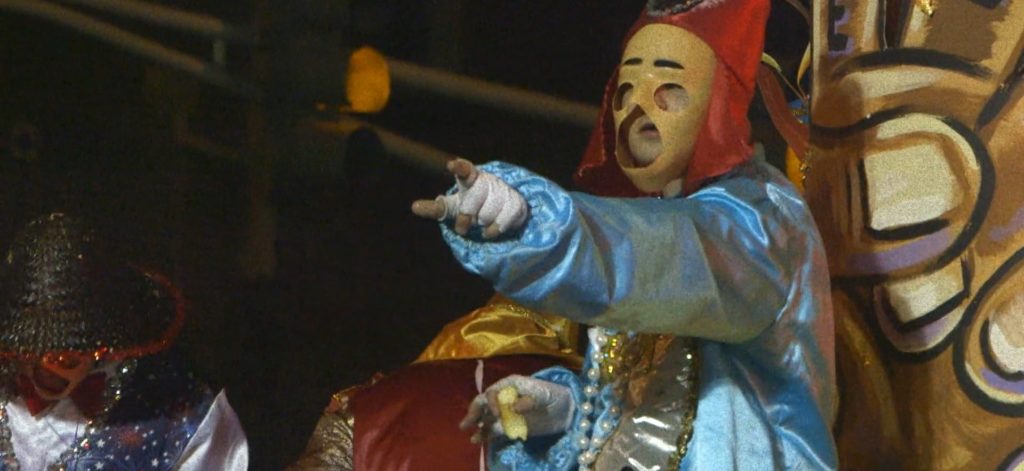
To sum up, Fat Tuesday is a film that sometimes moves like a high-speed train and sometimes like a snail, featuring dialogue one will love or hate, depending on previous exposure to anything from the mumblecore scene (seeing the first two VHS movies first would be a big help, especially Ti West’s segment in the first one, ‘Second Honeymoon‘ – featuring Joe Swanberg and Sophia Takal – as would seeing ‘Baghead‘ or the much more recent ‘She Dies Tomorrow‘). It sometimes feels like a documentary, as it was shot on location and the sound mixing doesn’t place the voices of the main characters front and center, instead going for a more ‘surround feel’. Hannah Gross shines in it, in a role she hasn’t really been seen in, while the cinematography and editing also impress. Mumblecore is, otherwise, really an affair about getting familiar with a bunch of actors and filmmakers and following their entire careers – one could spend a lifetime studying it, and although nowadays it doesn’t really have the traction it had 10 years ago, movies like ‘Shirley‘, ‘The Rental‘ or ‘Black Bear‘ owe a lot to it. For fans of this one, be sure to check out Torres-Torres’s ‘Sisters of The Plague‘, or ‘Creep/Creep 2‘ and ‘Privacy Setting‘.
More Film Reviews
Halloween Kills Film Review (2021) – Michael Walks Home
As a newcomer to the Halloween franchise, I am less experienced with the later sequels to have any attachment to the worldbuilding, and I controversially thought Rob Zombie’s film was…
Nutcracker Massacre (2022) Film Review – Crack Deez Nutz
There’s A New Christmas Monster in Town… And He Wants Your Nuts Every December, fans of shlock gather around their televisions and tune in to Tubi, scrolling excitedly through a…
The Free Fall (2021) Film Review – Dreams, Gaslighting, or Something Sinister?
Traumatised from witnessing the horrific death of her parents, Sara attempts to take her own life. Waking up in the aftermath of this, she cannot remember anything and does her…
Night Drive (2019) – The Gig Economy Sucks
Running a ride share for some extra money at Christmas, time goes awry for Russell when he picks up the mysterious and frenetic Charlotte. The misadventures which follow turn increasingly…
Lake of the Dead (1958) Film Review – A Classic Norwegian Haunted Lake Tale
The Hammer films of the late ’50s and ’60s are my go-to comfort films. I’m particularly partial to ones starring Peter Cushing and Christopher Lee, but honestly, who doesn’t love…
The Story of Southern Islet Film Review – A Curse On You!
Set to screen at the 2021 Fantasia Film Festival, Story of a Southern Islet rests as Malaysia’s only entry into the prestigious festival. Having found myself intently interested on the new…

